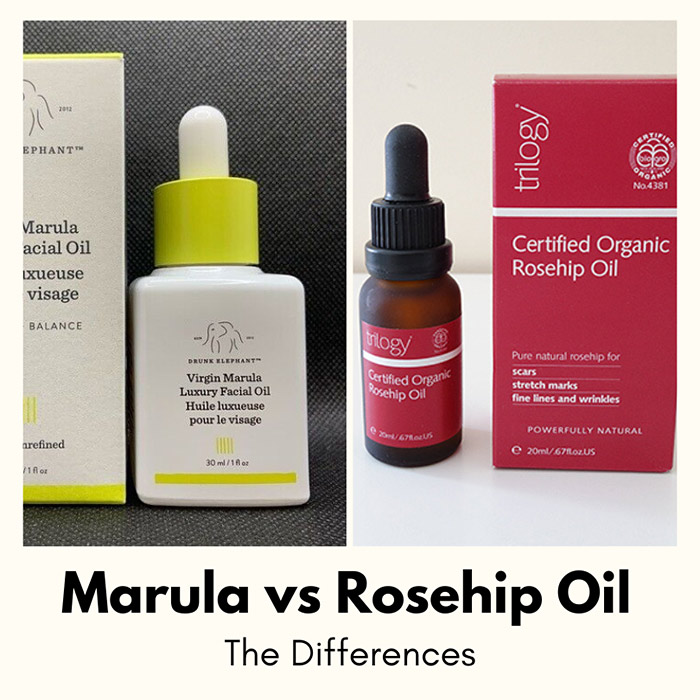
When it comes to marula oil vs rosehip oil for your skincare, choosing the right one can make all the difference. These natural oils are popular for their antioxidant and anti-aging benefits, and you’ll find them in many skincare products. They’re good for various needs, like moisturizing and acne treatment.
But what is so special about these oils that even celebrities and royalty do not seem to get enough of them? Holly Robinson Peete swears by The Leakey Collection’s Marula Oil, and Kate Middleton cannot do without Trilogy’s Rosehip oil.
Which one should you choose for your skin? In this article, we’ll focus on the marula oil vs rosehip oil debate to help you understand their unique benefits and decide which one might be the best fit for you.
We’ll break down the key features of marula and rosehip oil, showing you why incorporating one of them into your skincare routine could be beneficial. Let’s explore these popular choices and see how they can contribute to healthier skin.
Disclaimer: This post contains affiliate links which means I may get a small commission if you purchase a product after clicking on a link. This does not cost you anything. As an Amazon Associate, I earn from qualifying purchases.
Table of Contents
- What Exactly is Marula Oil?
- Understanding Rosehip Oil
- Marula Oil and Rosehip Oil: What They Have in Common
- Marula Oil vs. Rosehip Oil: Understanding Their Differences
- Marula oil or Rosehip oil – Which one is better for your skin type?
- Can you mix marula oil with rosehip oil?
What Exactly is Marula Oil?
Marula oil is a light yellow, nutty-scented oil extracted from the kernel seeds of the marula fruit. These seeds are carefully selected and pressed to produce the oil.
Predominantly found in the southern regions of Africa, including Kenya, South Africa, and Namibia, marula oil has a rich history. For generations, various parts of the marula tree have been utilized for their medicinal and nutritional benefits.

Having gained recent popularity in the mainstream cosmetic industry, marula oil is celebrated for its exceptionally light texture and potent moisturizing properties. It’s a superstar ingredient that has made its way into a wide array of cosmetic products, catering to skin, hair, and nails. Its versatility and effectiveness make it a sought-after addition to many beauty routines.”
Benefits of Marula Oil
Hydrates Deeply: Marula oil is a hydration powerhouse. Scientific studies confirm its remarkable ability to moisturize. Packed with essential fatty acids like oleic, linoleic, palmitic, stearic, and myristic acids, it deeply nourishes your skin. Plus, its linoleic acid content helps boost your skin’s natural lipids, strengthening its moisture barrier. If you have dry skin, marula oil could be your new best friend.
Rich in Antioxidants: This oil is a treasure trove of antioxidants. It’s loaded with phenolic compounds, vitamin E, and vitamin C, which shield your skin from free radical damage and UV rays, known to cause uneven skin tone. Its high vitamin C content, even more than an orange, also helps boost collagen, making it a favorite for mature skin.
Repairs and Rejuvenates: Amino acids in marula oil play a vital role in maintaining healthy skin. L-arginine aids in repairing visible skin damage like wrinkles and fine lines, while glutamic acid acts as a skin conditioner, keeping your skin looking fresh and rejuvenated.
Light and Non-congestive: Marula oil’s light texture allows it to be easily absorbed by your skin. Dr. Sheerene Idriss, a certified dermatologist, notes that it helps other skincare products penetrate deeper. However, it’s worth noting that marula oil has a mild comedogenic rating (3-4), so those with acne-prone skin should use it cautiously.
Anti-Aging Potential: While many claim marula oil has anti-aging benefits, scientific evidence is still emerging. A 2018 study suggested that marula stem extract might help maintain collagen and elastin in the skin, hinting at its potential as an anti-aging ingredient.
Soothes Inflammation: Marula oil has been used for years in African traditional medicine for its anti-inflammatory properties, making it effective in healing wounds and reducing scarring. Its moisturizing quality also makes it a soothing agent for irritated or itchy skin, ideal for those with conditions like eczema.
Understanding Rosehip Oil
Rosehip oil, also known as rosehip seed oil, comes from the seeds of wild rose bushes. The most commonly used varieties in the beauty industry are Rosa canina (dog rose) and Rosa rubiginosa (sweet briar). These oils are primarily sourced from the Andes Mountains in Chile and Argentina.
The rosehip oil is extracted through a cold press process from the seeds found beneath the rose petals, ensuring that all the rich nutrients are preserved. These nutrients include a rich blend of vitamins, fatty acids, and antioxidants. The oil is easily recognized by its red/orange color, which comes from its high carotenoid content, showing how rich and beneficial the oil is.

So far, most of the existing research on rosehip’s skin benefits has been focused on its powdered form, and a significant amount of testing has been conducted on animals. However, experts in the field remain optimistic about the oil’s potential.
Given that the benefits of many compounds found in rosehip oil, when applied topically, are already recognized, it is anticipated that the oil itself would offer similar advantages for skin health.
Exploring the Benefits of Rosehip Oil
Reduces signs of ageing: Rosehip oil is rich in antioxidants, including vitamin A and smaller amounts of vitamin C, which are vital for protecting the skin against UV rays that accelerate aging. These vitamins stimulate the regeneration of damaged skin cells and, along with vitamin E, protect skin DNA from free radical damage. A 2015 study on rosehip powder consumption showed notable improvements in skin aging conditions, indicating the oil’s potential to enhance skin cell longevity.
Hydration and Moisturization: This oil excels in hydrating and moisturizing the skin, thanks to its composition of oleic and linoleic acids. These fatty acids not only replenish skin moisture but also strengthen the skin’s moisture barrier, making it a valuable addition for dry skin care.
Boosts Collagen Production: As skin ages, it loses elasticity due to the breakdown of collagen. Research on rosehip powder has demonstrated significant improvements in skin elasticity over eight weeks, suggesting that the oil’s high vitamin A and C content can aid in collagen production, leading to firmer, more youthful skin. However, it’s important to note that rosehip seed oil, with lower vitamin C levels, may offer different results.
Brightens Skin: The vitamin A in rosehip oil accelerates skin cell renewal, promoting a brighter, more radiant complexion. Its lightweight nature ensures quick absorption without clogging pores, making it ideal for a glowing appearance.
Anti-Inflammatory Properties: Rosehip oil contains essential fatty acids and vitamin E, both known for their soothing effects. This combination makes the oil an effective anti-inflammatory, suitable for calming irritated skin.
Reduces Hyperpigmentation and Scars: Vitamin A, or retinoid, in rosehip oil is effective in reducing hyperpigmentation and dark spots. A 2015 study highlighted its efficacy in improving the appearance of post-surgical scarring when applied topically over 6-12 weeks. Additionally, the beta-carotene in rosehip oil is believed to have skin-lightening properties, further enhancing its ability to even out skin tone.
Marula Oil and Rosehip Oil: What They Have in Common
Marula oil and rosehip oil are both loved in skincare for good reasons. Here’s what they share:
- Antioxidants for Protection: They are packed with antioxidants. This helps protect your skin from sun damage and pollution. But remember, they don’t replace your regular sunscreen.
- Fatty Acids for Skin Health: Both oils have essential fatty acids. These are great for reducing inflammation and keeping your skin hydrated.
- Helping with Aging: They can both help slow down signs of aging and might help your skin make more collagen. More studies are needed to know just how well they do this, especially for marula oil.
- Gentle and Non-Greasy: Neither oil is heavy or irritating. They’re good for calming your skin and making it smooth.
- Rich in Vitamin E: This vitamin is great for fixing skin damage and keeping skin healthy. Both oils have plenty of it.
- Easy to Use: You can use either oil on your face after moisturizing. They can make your skin feel softer and more supple.
Marula Oil vs. Rosehip Oil: Understanding Their Differences
While marula oil and rosehip oil share some benefits, they’re quite different in their makeup. These differences are key to deciding which one might be best for your skincare needs.
| Characteristic | Marula Oil | Rosehip Oil |
|---|---|---|
| Oleic Acid Content | High (70-78%) | Lower (14%) |
| Linoleic Acid Content | Lower (4-7%) | High (54%) |
| Linolenic Acid Content | Minimal (0.7%) | Higher (19%) |
| Comedogenic Rating | More likely to clog pores (3-4) | Less likely (1) |
| Vitamin C | Contains some | Mostly lost in extraction |
| Best For Skin Types | Dry and sensitive/mature | Oily and acne-prone (but suitable for all) |
| Primary Focus | Hydration and moisture | Aging, brightening, collagen production |
| Carotenoids Level | Lower | Higher |
Marula Oil is a great choice if you’re looking for hydration and have dry or mature skin. It has a higher oleic acid content, which is good for locking in moisture but can be more comedogenic.
Rosehip Oil, on the other hand, is ideal for oily and acne-prone skin types, though anyone can use it. It’s rich in linoleic and linolenic acids, which are great for skin aging and brightening. It also helps with collagen formation but has less vitamin C due to its extraction process.
By understanding these differences, you can make a more informed choice about which oil might work better for your specific skin needs.
Marula oil or Rosehip oil – Which one is better for your skin type?
- Normal skin: Unless an allergic reaction occurs, both oils are good for normal skin. Your choice of either of them will depend on what your routine targets. For anti-ageing, rosehip oil is more suited. Meanwhile, for hydration and moisture, marula oil is best.
- Dry skin: Dry skin needs all the hydration and moisture it can get. Therefore, marula oil is what you should go for if you have dull, flaky, or itchy skin. Its high concentration in oleic acid offers lots of hydration.
- Oily skin: With rosehip oil being less comedogenic than marula oil, it is more suitable for oily skin types. Its high concentration is linoleic acid helps keep the skin moisturized while vitamins A increases cell turnover.
- Sensitive /Mature skin: For ageing or damaged skin, both oils are suitable. Rosehip oil will provide phytonutrients that prevent aggressions, boost collagen production, and slows down ageing. And marula oil will work to reinforce the skin’s moisture barrier and prevent trans epidermal water loss.
Best rosehip oil brands:
- Trilogy Certified Organic Rosehip Oil
- Pai Rosehip BioRegenerate Oil
- Alteya Certified Organic Cold Pressed Rosehip Seed Oil
Best marula oil brands:
- InstaNatural Organic Marula Facial Oil
- Shea Terra Namibian Marula Cold-Pressed Extra Virgin Oil
- SVA Organics Marula Oil Organic USDA
Marula oil vs rosehip oil: Which one is better for acne?
Because rosehip oil scores lower on the comedogenic scale, it has fewer chances to clog pores and is the best option for acne-prone skin.
Rosehip oil has high amounts of active compounds such as polyphenols, flavonoids, and carotenoids (beta-carotene) that all act to treat and reduce acne flare-ups and fade scarring.
Can you mix marula oil with rosehip oil?
So far, there exists no counter indication that these two oils do not go together. You can benefit from the benefits of each of them.
Although they carry no dermal limits (unless you are using them in the form of essential oils), they need to be used in moderation to avoid skin congestion.
Always make sure you do a patch test on your arm 24 hours before using either of them to be sure of no allergic reactions.
CONCLUSION – WHICH IS BETTER, MARULA OR ROSEHIP OIL?
Ultimately, choosing which of these two oils is best for you rests on your skin’s specific needs. For someone battling acne, rosehip oil will be a better option. On the other hand, someone with dry or dehydrated skin should opt for marula oil.
Factors like weather and hormonal changes in your body may also impact your choice. But understanding the properties of each of these oils will help you choose which is best for you.
As seen above, both oils have incredible benefits that certainly justify the fact that they are high in demand. We haven’t even yet discovered all they have in store since more research is still being carried out.
Related content:
Bio-oil vs Rosehip Oil
Guidelines on how to use rosehip oil safely in pregnancy
Trilogy Organic Rosehip Oil Review

Petra Nakashian (previously Kravos) is a dedicated natural health and beauty blogger, driven by the loss of her parents to cancer, which led her to meticulously research beauty product ingredients. With over 10 years of experience, her in-depth knowledge has made her a trusted expert in the field. Founder of Be Healthy Now and Green Beauty Talk, Petra recently expanded her expertise with Beauty Insights Hub, exploring a wider range of beauty treatments. Committed to transparency and honesty, her work is a vital resource for navigating the complex world of beauty.

